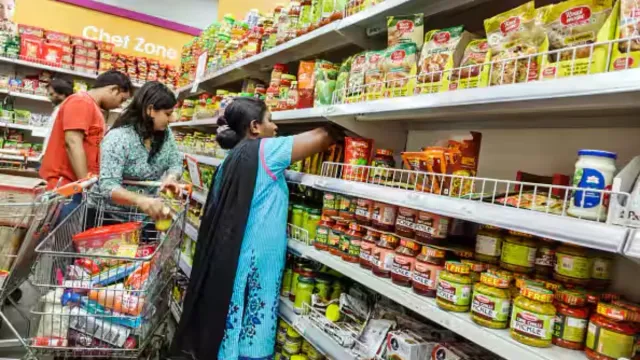- By Priyanka Koul
- Mon, 22 Sep 2025 07:58 AM (IST)
- Source:JND
GST 2.0 Tax Reforms: The Goods and Services Tax (GST) Council has rolled out a series of changes that will shake things up for everyday folks across industries like food, housing, cars, farming, healthcare, and education. These updates, decided in the 56th meeting led by Finance Minister Nirmala Sitharaman, kick in today, Monday, September 22, 2025.
इस बार नवरात्रि का यह शुभ अवसर बहुत विशेष है। GST बचत उत्सव के साथ-साथ स्वदेशी के मंत्र को इस दौरान एक नई ऊर्जा मिलने वाली है। आइए, विकसित और आत्मनिर्भर भारत के संकल्प की सिद्धि के लिए सामूहिक प्रयासों में जुट जाएं।
— Narendra Modi (@narendramodi) September 22, 2025
With the Bihar Assembly elections around the corner, these changes are hitting just before the state’s big festivals Chhath Puja and Diwali. Prime Minister Modi called the reforms a “double dose of happiness,” pointing out that they’ll likely make things like Durga idols for Navratri and Chhath Puja essentials (think soup, daura, and puja items) more affordable.
The reduction in GST rates before Diwali and Chhath Puja will provide people with more opportunities for shopping, increasing the vibrancy in markets during the festive season. The reduction in prices of daily and essential items is expected to bring relief to the common people in Bihar.
ALSO READ: Kharge Slams PM Modi Over GST, Labels It ‘Economic Wounds’ Cover-Up; Mamata Also Weighs In
GGST 2.0 Tax Reforms: Key Points
- From today, Monday, based on the GST Council’s decisions, revised GST rates will apply to various goods and services. These changes aim to simplify rates, eliminate discrepancies, and make the system easier for both businesses and consumers.
- GST exemption on life insurance policies: All individual life insurance policies are now exempt from GST. This includes term insurance plans, endowment policies, and unit-linked insurance plans (ULIPs). Reinsurance of these individual life policies has also been brought under the exemption.
- GST exemption on health insurance: Individual health insurance policies, including family plans and senior citizen-specific health policies, are exempt from GST under GST 2.0.
- Tax rates on transportation services: Passenger transport by road will continue to be taxed at 5 per cent without input tax credit (ITC). However, transport operators can choose to pay 18 per cent with ITC if they prefer. For air travel, economy class tickets remain taxed at 5 per cent, while business and other premium classes will continue to attract 18 per cent.
- GST on local delivery services: If local delivery services are provided through an e-commerce operator (ECO) by an unregistered service provider, the GST liability shifts to the e-commerce operator. If the delivery provider is registered under GST, then that provider will be responsible for paying the tax.
GST rate on local delivery services: Local delivery services have been set at a standard rate of 18 per cent.
- The Finance Ministry clarified why medicines remain taxed at 5 per cent rather than being made fully exempt. If medicines were completely exempted, manufacturers would lose the ability to claim ITC on inputs such as raw materials and packaging. This would raise their production costs.
- GST on leasing and renting: Leasing or renting of goods without an operator is taxed at the same rate as the goods themselves. For example, if the sale of a car attracts 18 per cent GST, then leasing that car without a driver will also be taxed at 18 per cent. The same principle applies to other goods.
- GST rates on imports: The revised rates under GST 2.0 will also apply to imports. Integrated GST (IGST) will be levied at the new rates starting from September 22, unless a specific exemption has been notified.
- Exemption for UHT milk versus plant-based milk: Ultra High Temperature (UHT) processed milk from dairy sources has been fully exempted. However, the exemption does not extend to plant-based milk. Until now, almond milk and similar drinks attracted 18 per cent GST, while soya milk was taxed at 12 per cent. Under GST 2.0, all plant-based milk drinks, including soya milk, will now attract a uniform 5 per cent tax.
- Reduction in GST on face powders and shampoos: GST on face powders and shampoos has been reduced. The Finance Ministry explained that the rate cut was not designed to favour large companies but to simplify the GST framework.
'Double Bonanza': PM Modi On GST reduction, income tax benefits
Reduction in the Goods and Serrices Tax (GST) rates would complement income tax benefits given earlier this year, creating a "double bonanza" for citizens, Prime Minister Narendra Modi said in Sunday
In his address to the nation on the eve of the implementation of the new Goods and Services Tax (GST) reforms, the Prime Minister linked the move to the government's broader reform agenda .
PM also lauded India's socio-economic progress, announcing that 25 crore people have overcome poverty in the last eleven years, giving rise to a dynamic "neo-middle class".
He described this neo-middle class as a powerful force driving India's development story.
( With Inputs from ANI )

